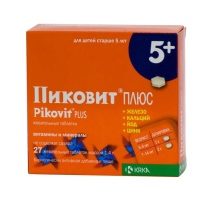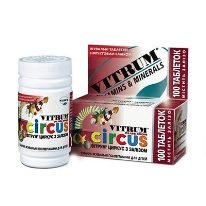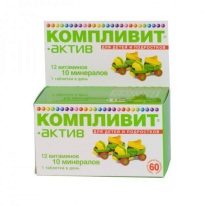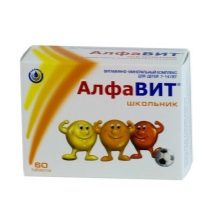Vitamin A for children
Among the nutrients that are required for a child to grow at any age, one of the most important is considered vitamin A, which is also called retinol. It is important for parents to take care of their sufficient entry into the child’s body, so they should know what products are the source of this vitamin substance and whether it is possible to give vitamin A to children as supplements.
Effect of vitamin a
The best known effect of vitamin A is supporting visual acuity.especially in low light. The compound is part of the pigment, which catches even weak light and allows you to see the outlines of objects at night. That is why with retinol deficiency, a disorder occurs that is called "night blindness".
Vitamin A also notes these important properties:
- Activation of growth processes of the child's body. Retinol is especially important for stimulating the growth of bones, hair and teeth, since it plays a big role in strengthening them. In addition, vitamin A contributes to a more rapid healing of any skin lesions, such as scratches, cuts or abrasions.
- Strengthen immunity and increase the body's resistance to infectious agents. Vitamin A increases the barrier function of the nasopharyngeal mucosa, which is why viruses and bacteria cannot enter the body. And due to the increased activity of leukocytes, such a vitamin will help to cope with those alien particles that have yet penetrated the body of the toddler. It has a retinol and antioxidant effect, due to which this vitamin protects the body from cancer.
Childhood Needs
Every day, children should receive vitamin A in such quantities:
|
Up to a year |
400 mcg |
|
1-2 years |
450 mcg |
|
3-6 years old |
500 mcg |
|
7-10 years |
700 mcg |
|
11-18 years old girls |
800 mcg |
|
11-18 years old boys |
1000 mcg |
It is important to note that a child can receive vitamin A not only in the form of retinol, but also in the form of provitamin A, which is called beta-carotene. This substance is a pigment belonging to the group of carotenoids. Once in the children's body, such a compound is broken down and oxidized, resulting in the formation of vitamin A.
Symptoms of shortage
Although vitamin A is included in the group of fat-soluble vitamins that have the ability to accumulate in the human body, however, with its constant shortage of food, children gradually develop hypovitaminosiswhich will manifest itself:
- Impaired vision. The child will be worse to see in poor light and in the evening (this is how “night blindness” appears). Sometimes the lack of retinol is manifested by partial color blindness (the child ceases to recognize blue and yellow).
- Dry skin In children, the skin on the elbows and knees begins to peel off and harsh, and in severe cases, eczema develops.
- Frequent acute respiratory viral infections, bronchitis, and sometimes pneumonia, which is caused by a weakening of the barrier function of the respiratory tract.
- Dry cornea, which contributes to the appearance conjunctivitis, and with a strong deficiency can cause vision loss due to keratomalacia (corneal damage).
- Slowing the growth of the child.
- Impairment of hair condition (dull color), their enhanced loss and dandruff.
- Frequent appearance boils and stomatitis.
- Damage tooth enamel.
- Infectious lesions of the urinary system.
Vitamin A in products
It is known that children receive retinol mainly from animal products, and beta-carotene - from plant foods. In order for a child not to be deficient in vitamin A, his menu should include:
- Fish, caviar, cod liver and fish fat.
- Liver.
- Milk, butter, hard cheese, cottage cheese and other dairy products.
- Egg yolks.
- Carrots, spinach, dill, pumpkin, tomatoes, broccoli and other vegetables.
- Apricots, melons and other fruits.
It is also important to know that the absorption of vitamin A and its predecessor (beta-carotene) from food contributes to the presence of vitamin E, why add vegetable oil to dishes?
Vitamin A supplements
Pharmaceutical preparations, including retinol, can only contain this vitamin or its combination with vitamin E. Such supplements are indicated only with diagnosed vitamin A deficiency, therefore the doctor must prescribe them, selecting the right dosage for a variety of factors.
Independently giving a child vitamin A is possible only as part of a multivitamin preparation used to prevent nutritional deficiencies. In such complexes, retinol is presented in safe dosages to prevent its shortage, but not threatening an excess of this vitamin. Most often, to prevent vitamin A deficiency, children are given complexes Vitrum, Jungle, Complivit, Multi Tabs, Pikovit, Sana-Sol and others.
Beta-carotene supplements are also a good choice, as this compound in the child’s body is converted to retinol. In this case, an overdose of beta-carotene does not pose a danger to children, but only leads to a change in the color of the skin, which returns to its former appearance as soon as the additive is canceled. Among the rich beta-carotene supplements, the most popular are Alphabet complexes, Vetoron and Supradin Kids gel.
Release form
Supplements for children, including vitamin A, are produced in different forms. For the youngest children, it is very convenient to use the means in drops, and multivitamins in capsules are given to children over 7 years old, as they should be swallowed.
Sweet variants of vitamin A supplements, for example, a tasty gel, a multivitamin syrup or chewable tablets, are the most popular in childhood.
Indications
Multivitamins, including retinol or provitamin A, are prescribed:
- With a decrease in the content of vitamins and beta-carotene in food (this is observed in winter and in spring).
- With an imbalance in the diet of the child (especially if the menu is low in fat and protein).
- In diseases of the digestive tract, impairing the absorption of vitamins (colitis, hepatitis, peptic ulcer, pancreatitis and others).
- With increased load on the child's body, for example, when playing sports.
Drug use "Aevit", Retinol capsules or in solution is indicated only for vitamin A deficiency. The use of carotene oil solution as lotions is in demand for burns, difficult healing wounds, ulcers, eczema and other skin problems, as well as stomatitis.
Contraindications
Instructions for use
Preparations with vitamin A are best given to the child in the morning or afternoon, so that their ingredients are absorbed better. Often, multivitamin complexes are given during meals (usually during breakfast) or after meals.
Overdose
If you voluntarily give children vitamin A in pharmacy supplements or exceed dosages of multivitamin preparations, the child will receive retinol in an amount much higher than the permissible norms. This threatens to overdose, which is quite dangerous for the health of children. This condition will manifest itself:
- Increased body temperature.
- Nausea or vomiting.
- Increased sweating.
- Weakness
- Drowsiness.
- Rash and redness on the skin.
- Increased intracranial pressure.
- Weeping mood and irritability.
- Pain in the bones or muscles.
- Hair loss
- Headaches.
- Lack of appetite.
- Weight reduction.
If you experience any problems while taking supplements with vitamin A, you should immediately consult a doctor to stop the drug in time and eliminate its negative effects.
Take a look at the Soviet cartoon about the benefits of vitamin A:
More about the importance of a balanced diet of the child and vitamins, see the transfer of Dr. Komarovsky.





















